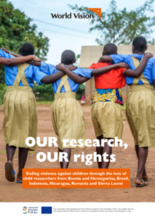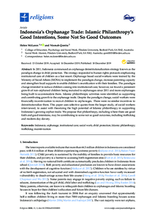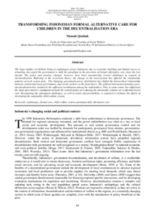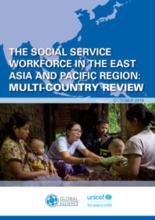demographic_data
childrens_living_arrangement
children_living_without_bio
adoption
social_work_force
key_stakeholders
Key Stakeholders
Add New DataOther Relevant Reforms
Add New Datadrivers_of_institutionalisation
Drivers of Institutionaliziation
Add New Datakey_research_and_information
Key Data Sources
Add New DataDisplaying 21 - 30 of 109
A collaborative team between The Jakarta Post and Tirto.id have uncovered facts that confirm that both the state and the Catholic Church allowed a suspected child molester who was running an orphanage in Depok West Java "to walk free from police detention to celebrate Christmas, and a few months later set up a new orphanage and live among vulnerable boys again," according to this article from the Jakarta Post.
"Child representatives and care leavers from South East Asia have called for increased support for continuing education, psychosocial care, finding jobs and affordable housing in the wake of COVID-19," according to this news article from SOS Children's Villages.
This child-led research initiative was conducted under the umbrella of World Vision’s DEAR project (Development Education and Awareness Raising) and the Sustainable Development Agenda 2030. The study explores explore SDG 16.2, the goal that focuses on the issue of ‘abuse, exploitation, trafficking, and all forms of violence against and torture of children’.
A survey administered by Save the Children in Indonesia has revealed several key risks faced by children and families in Indonesia as a result of the COVID-19 pandemic, according to this article from the Jakarta Post.
This exploratory research led by Kindernothilfe between May – July 2020 shows how the challenges facing working children and their families have been exacerbated since the outbreak and it presents their recommendations for effective and relevant responses to the pandemic.
This report (translated into Bahasa Indonesia) has one central purpose: To raise the alarm globally as to the catastrophic impact of the COVID-19 pandemic on persons with disabilities worldwide, including children with disabilities, and to catalyse urgent action in the weeks and months to come.
This paper uses selective quotes from a larger study of social workers interviewed to assist with theorizing the high potential of Islamic philanthropy in supporting Indonesia’s growing orphan trade.
This article describes the challenges in changing policy and practice in the provision of formal alternative care in Indonesia.
The first multi-country review of the social service workforce in the East Asia and Pacific region was prepared by the Global Social Service Workforce Alliance (GSSWA) and the United Nations Children’s Fund (UNICEF) East Asia and the Pacific Regional Office (EAPRO) with the support and contribution of many people throughout the region. This report is one of several regional reports being produced by GSSWA and UNICEF to increase the availability of information on the social service workforce, and provide a baseline from which to consider ongoing workforce strengthening initiatives.
This study aimed to identify the factors that affect the incidence rate of neglected children in Indonesia by considering the household effect.






